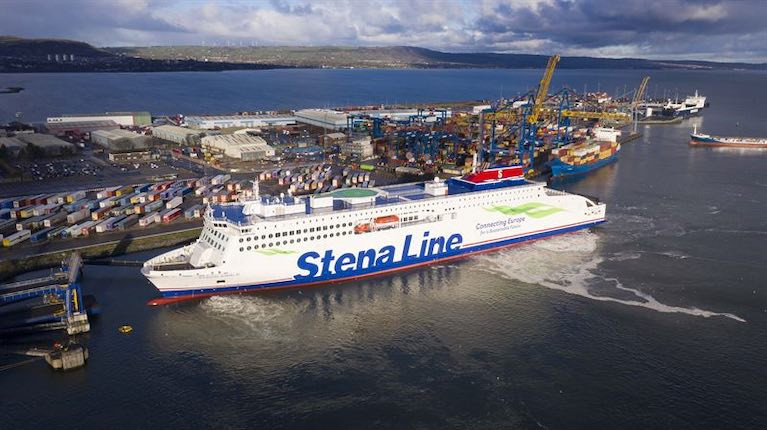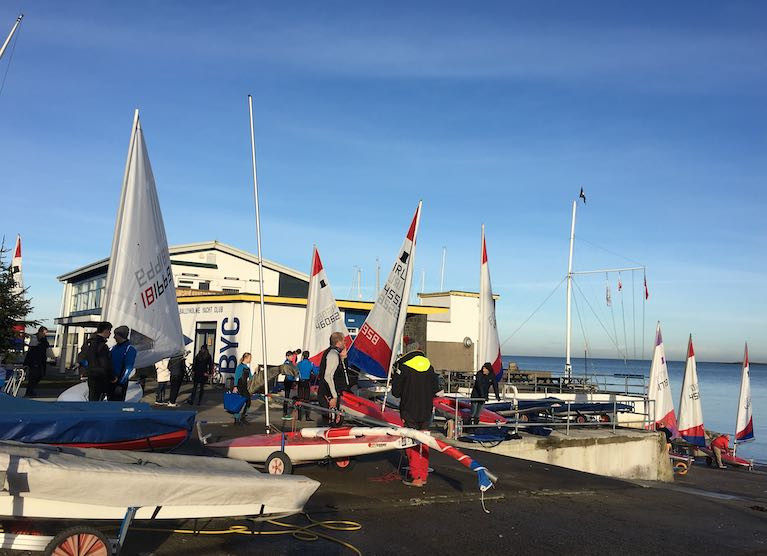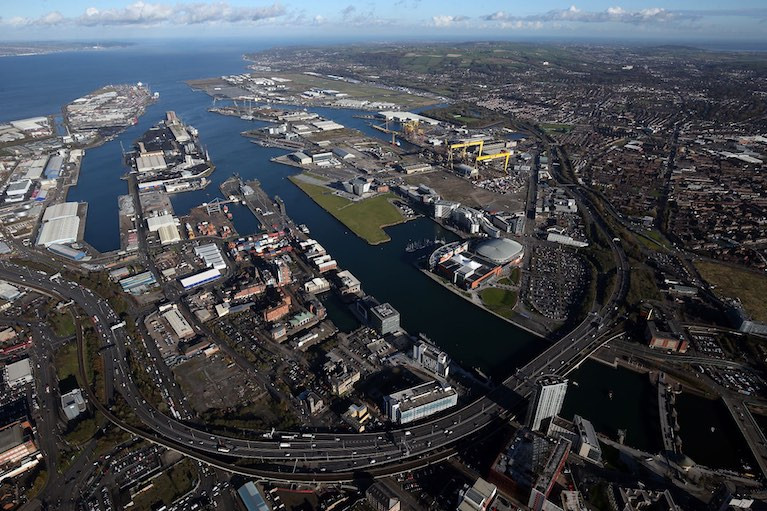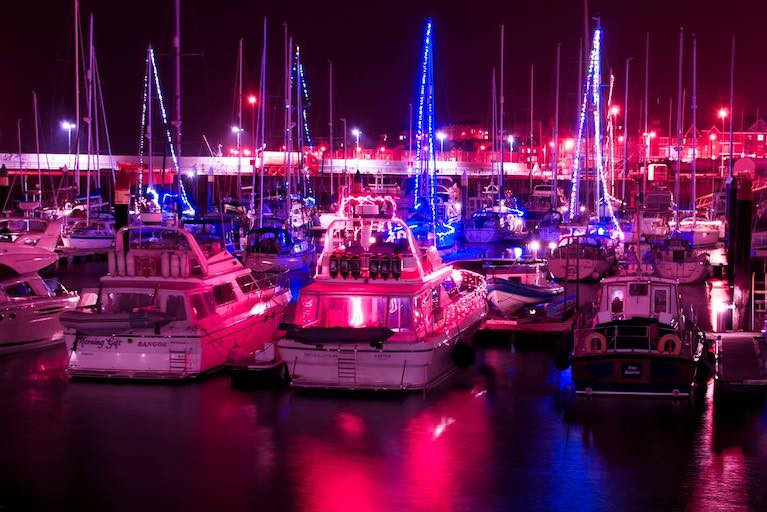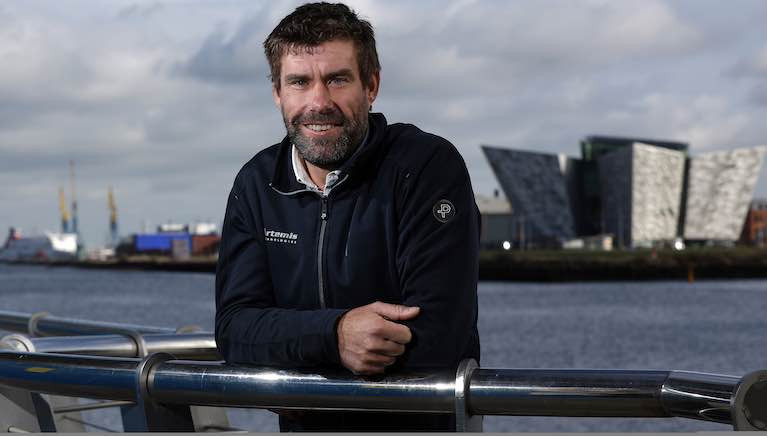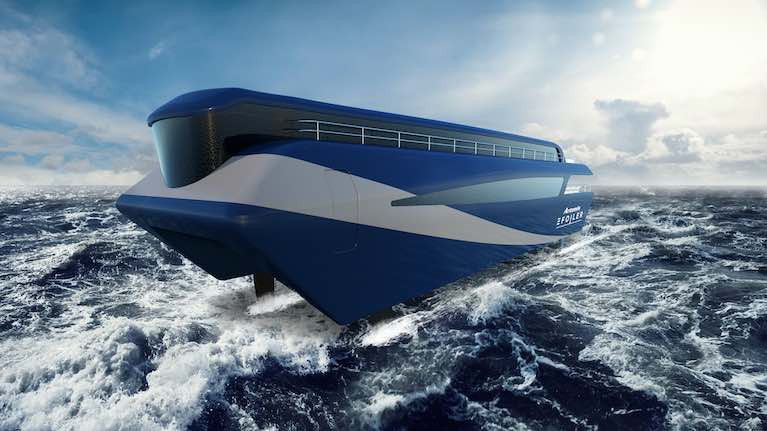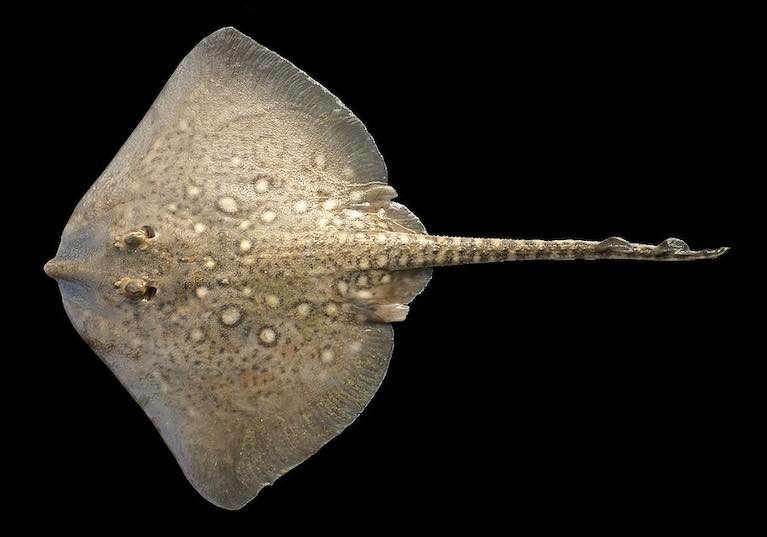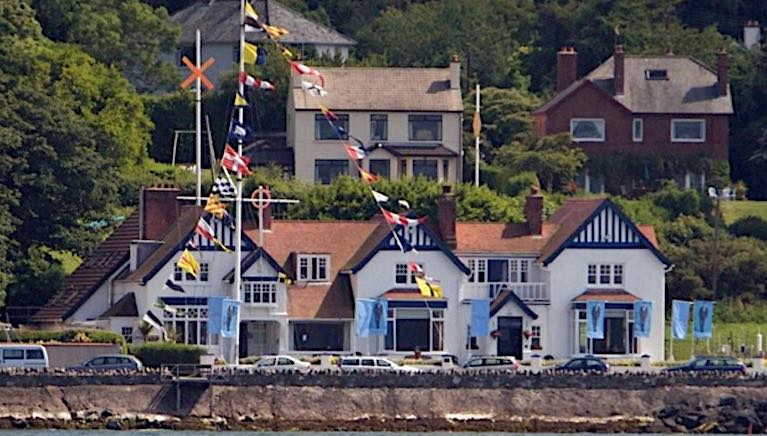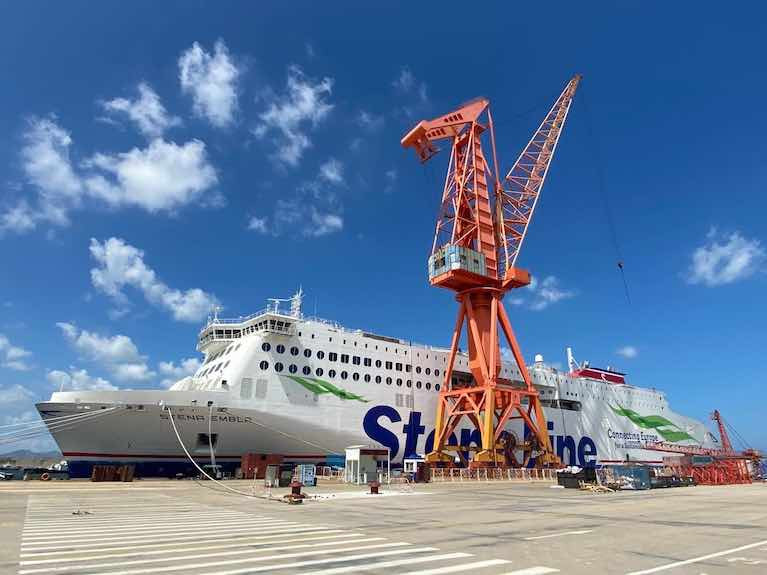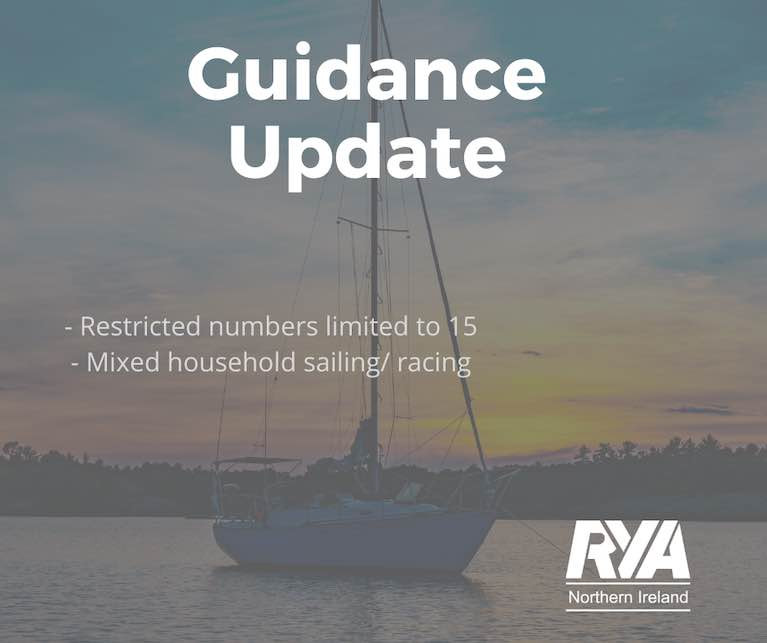Displaying items by tag: Belfast Lough
New Stena Embla Arrives in Belfast Harbour (Drone Video)
Stena Line’s newest ferry addition to its fleet, the brand-new Stena Embla has arrived in Belfast.
As Afloat reported earlier, Stena Embla is the third E-Flexer ferry to be commissioned for Stena Line’s Irish Sea routes in the last 12 months, three of the most modern ferries in the world. Stena Embla will join her sister ship on the popular Belfast – Liverpool route later this month. Stena Embla has the capacity to carry 1 000 passengers, 120 cars and 3,100 lane metres of freight. This will provide a significant 20% increase in freight capacity for the route, which is expected to see an increase in demand post-Brexit.
Paul Grant, Stena Line’s Irish Sea Trade Director said: “The arrival in Belfast of our newly built Stena Embla is yet another important milestone in the ongoing enhancement programme of our Irish Sea services. We have now invested over £400m in our ferries and port facilities on the Irish Sea in recent years. The Belfast-Liverpool route is one of the most popular Irish Sea crossings for both freight and leisure traffic so having a second vessel of the calibre of Stena Embla, with a host of high-quality passenger facilities, will further increase its appeal and expand our capacity.”
“In March 2020 we launched our new build Stena Edda onto the Belfast-Liverpool service and the feedback from our freight and leisure customers was extremely positive. Now we will have two ships offering identical services and facilities which will help take our service levels on the route to new heights. We have real confidence in the future of our Belfast services and our Irish Sea routes in general, which is why this region has attracted three brand new ships in the last 12 months alone.”
Paul Grant concluded: “Clearly 2020 has been a difficult year for our business, however, despite this Stena Line has remained resolute in our ongoing commitment to driving our freight and travel business forward in the region.”
Stena Embla will make one daily return trip between Belfast and Liverpool. Stena Line is the largest ferry operator on the Irish Sea, with the biggest fleet offering the widest choice of routes including, combined passenger and freight services from Belfast to Cairnryan and Liverpool, Dublin to Holyhead, and Rosslare to Fishguard routes, as well as a freight only route from Belfast to Heysham, a total of up to 238 weekly sailing options between Britain and Ireland. Stena Line also offers a direct service from Rosslare to Cherbourg with 12 crossings per week.
Cadet Sailing Event at Ballyholme Before New COVID Restrictions Begin in Northern Ireland
Thirty young sailors managed a final outing at Ballyholme yesterday (December 22nd) before Covid 19 restrictions would put paid to their activities at the Club for six weeks. And the event was blessed with a bright sunny day, albeit with a light and dying wind.
The first race got off in a westerly with the eight Lasers away three minutes before the Toppers. As the leading Lasers approached the end of lap one, the wind became very unstable, forcing an early finish. But the Toppers all managed to complete their lap with some of the shifts seeing lots of place changes in the pack. One of those changes was by Topper helm Daniel Palmer, who overtook some of the Lasers who had started a lap ahead, to win in the Topper fleet with Hugo Boyd second. Laser Radial winner was Hannah Dadley-Young with Charlie O'Malley putting in a good performance beating the other Radials to get second over the water.
With the wind settling into the North West, the mark layers reset the course, and both fleets got quickly away. The Lasers enjoyed a steady wind and completed two laps with the Toppers managing just one. Hannah took another win with another face, Charlotte Eadie runner-up in the Lasers, and in the Toppers it was Palmer first again ahead of Katie Brow with Emil McAfee third.
A final race was attempted in the last of the breeze. Only the Lasers managed a full lap before the wind completely shut down with Charlie O'Malley first giving him the overall top place. Hannah Dadley-Young finished back in sixth, a great recovery having started late due to gear issues, but this sixth was enough to give her runner-up slot, with Charlotte Eadie taking third.
Annabel and Emily Rideout in their Feva were the only double-handed sailors afloat, (complying with the regulations being the same household) and raced with the Lasers. Once back ashore, which required a tow for some, there was no formal prize-giving, but all the competitors received a Santa selection box as a reward for braving the cold!
Cadet Training and Racing officer David Nelson was pleased with the success of the event. "Thanks to BYC for facilities and prizes and to the volunteers for running these cadet activities".
Belfast Maritime Consortium Supervisory Board Appointed
A supervisory board has been appointed to oversee the Belfast Maritime Consortium’s project to develop revolutionary zero-emission ferries in the city.
Earlier this year, the 13-partner syndicate, headed by Artemis Technologies, won a £33 million government innovation grant for the plans from the UK Research and Innovation’s flagship Strength in Places (SIP) Fund.
Working closely with the SIP Programme Director, Prof. Mark Gillan, the supervisory board will provide strategic leadership and support to the Belfast Maritime Consortium UKRI Strength in Places project, and oversee its successful completion.
Former Transport Minister, Nusrat Ghani MP, will chair the supervisory board which will include members from consortium partners, Dr Iain Percy OBE, CEO of Artemis Technologies, Nick Laird, Director, Advanced Air Programmes, Spirit AeroSystems, and Joe O’Neill, CEO, Belfast Harbour.
The board will be completed by independent members Dr Jayne Brady MBE, Digital Innovation Commissioner, Belfast City Region Deal, David Morant, Managing Director, Scorpio UK, and Harry Theochari, Partner and Global Head of Transport at Norton Rose Fulbright LLP.
Speaking ahead of the board’s first meeting, Ms Ghani said:
“It is a pleasure to be appointed Chair of the Supervisory Board which will play an important role in overseeing the successful completion of the Belfast Maritime Consortium’s project.
“Including private funding from consortium partners, the total investment in Belfast will be around £60m over the next four years, it will create an initial 125 research and development jobs, and lead to more than 1,000 in the region over the next 10 years.
“However, the impact will go much further. The zero-emission fast ferries to be designed and built in Belfast will herald a revolution in green maritime transport that will have an impact around the world.
“As countries across the globe seek solutions to become carbon net-zero, the UK will lead the way, with Belfast at the centre. It is a privilege to play our part.”
'Light Up, Light Up'; Bangor Marina's Call to Boat Owners
Bangor's favourite band, Snow Patrol, are well known for the lines in their hit 'Run' - Light up, Light up. And that's what, in this year of endless restrictions, Kevin Baird Manager of Bangor Marina on Belfast Lough, would like berth holders to do for a competition in December.
It would be especially cheerful in these Covid 19 times, to make an effort, get out your Christmas lights and decorate your boat.
There will be a prize for the best-illuminated craft and equally appealing, is the gift of Mulled Wine for each participant.
Details will be posted on the Marina Facebook page in the coming days and judging will be on the evening of 18th December. Also, keep an eye out for information about another highlight on 18th December.
The usual Mince Pies, Mulled wine, tea, coffee and soft drinks served to you onboard your boat between 2 pm and 5 pm.
Belfast Lough Artemis Fast Ferry Boss Iain Percy Salutes UK's 'Green Industrial Revolution'
In response to the announcement by the Prime Minister Boris Johnson of a ten-point plan for a Green Industrial Revolution, Dr Iain Percy OBE, CEO, Artemis Technologies said:
“The Prime Minister’s blueprint for a ‘Green Industrial Revolution’ is a welcome boost to industries such as maritime as we aim to build a more sustainable future, and aligns with our plans to develop cleaner ships and maritime transport systems.
“With our vision to lead the decarbonisation of maritime, we are very much part of that revolution and are committed to helping the country meet its net-zero carbon target.
 The electric hydrofoil propulsion system, the Artemis eFoiler, is to be built in Belfast
The electric hydrofoil propulsion system, the Artemis eFoiler, is to be built in Belfast
“Our transformative electric hydrofoil propulsion system, the Artemis eFoilerTM, currently being developed with our partners in the Belfast Maritime Consortium, will enable the disruption of the market and power the high-speed green vessels of the future.
“The fast ferries to be designed and built in Belfast, will be capable of carrying over 350 passengers and will be zero-emission and require up to 90 per cent less energy than traditional high-speed ferries.
“This will have a huge impact, not just in maritime public transport, but also in sectors such as offshore energy, where the technology can be utilised to decarbonise operations.
”Together with the required increased investment on infrastructure at ports and across our cities, the UK can lead the world in clean energy and greener transport and we are proud to play our part.”
Belfast Lough's Artemis Technologies Carbon Vision wins Maritime 2050 award
Artemis Technologies has won the prestigious Maritime 2050 accolade at this year’s Maritime UK Awards.
The award, sponsored by the Department of Transport, recognises the firm’s efforts to capitalise on the opportunities presented within the Government’s Maritime 2050 Strategy.
Founded in 2017, Artemis Technologies, led by double Olympic sailing gold medallist Dr Iain Percy OBE has a mission to lead the decarbonisation of the maritime sector through innovative and sustainable technologies and products.
It is the lead partner in the Belfast Lough Maritime Consortium which aims to design and build zero-emission high-speed ferries in the city by creating a unique electric hydrofoiling propulsion system that will revolutionise the industry.

David Tyler, Commercial Director, who accepted the award commented: “We are extremely proud to have received the Maritime 2050 Award as we continue to work towards developing our transformative electric hydrofoiling propulsion system, the Artemis eFoilerTM that will power green vessels of the future.
“With a recent report from the International Maritime Organisation (IMO) indicating that approximately 30% of ship emissions come from domestic voyages – twice as high as previously estimated, it is clear the type of vessels we will develop will play a major part in cutting the release of CO2.
“We are proud that our efforts have been recognised and we appreciate the support and confidence invested in us so far.
“Huge congratulations go out to all of this year’s category finalists and winners.”
The vessels to be developed in Belfast, capable of carrying up to 350 passengers, will require 90 per cent less energy than traditional ferries and produce zero emissions during operation.
It is estimated the project will prevent 77 million cubic metres of CO2 emissions by 2026, helping the UK reach a number of its net zero objectives and realise ambitions set out in the Maritime 2050 Strategy’s Clean Maritime Plan.
Anglers Express Concern Over Demise of Thornback Ray on Belfast Lough
Alex Easton, MLA has called on the Department of Environment, Agriculture and Rural Affairs (DEARA) Minister to create Marine Protections Areas in Belfast Lough.
Belfast Lough is a long, wide, and deep expanse of water, virtually free of strong tides lying between County Antrim and County Down. The inner part of the Lough comprises a series of mudflats and lagoons, and the outer Lough is restricted to mainly rocky shores with some small sandy bays. The outer boundary of the Lough is a line joining Orlock Point on the County Down side and Blackhead on the County Antrim coast, giving about 30 square miles (78 km2) of open water.
The Northern Ireland Federation of Sea Anglers brings together all the sea angling people of Northern Ireland whether fishing shore or boat. Members recently met at Bangor Marina with DEARA Minister Edwin Poots, South East MP Paul Girvan and MLAs Alex Easton and Gordon Dunne. The meeting gave NIFSA the chance to highlight the federation's concerns, amongst which was the reintroduction of the Thornback Rays into Belfast and Larne Loughs, the setting of artificial reefs and the creation of Marine Protection Areas within the Lough.
 Minister Edwin Poots (left) meets anglers Harry McKee (Secretary of NIFSA) and Barry Platt (right) Photo: NIFSA
Minister Edwin Poots (left) meets anglers Harry McKee (Secretary of NIFSA) and Barry Platt (right) Photo: NIFSA
Mr Easton has said "It is quite clear that commercial fishing in Belfast Lough over many years has decimated many types of fish and wildlife within the Lough. Having spoken to anglers, they no longer catch many of the different species they once did due to overfishing by commercial fishing."
He continued, "A clear example of this is the Thornback Ray which was once abundant in the Lough and is now extinct due to commercial fishing. I would love to be able to see these Rays reintroduced to Belfast Lough, but to do this we would need a survey done of the Marine life, the creation of artificial reefs to support and grow fish numbers and the creation of Marine protection areas around Belfast Lough that cannot be fished by commercial fishing".
Alex Easton intends to write to the Agriculture and Environment Minister, Edwin Poots, about these matters. He continued. "I believe we have time to fix and protect Belfast Lough in a way that we can reintroduce wildlife such as the Thornback Ray, which can be bred at our own Exploris Aquarium Visitor Centre in Portaferry and reintroduced to Belfast Lough. We can ensure that the area is sustained for anglers to fish, which ensuring we grow and protect our Lough but is done sustainably."
Royal North of Ireland Yacht Club Community Christmas Appeal
With club sailing and fund-raising events sadly curtailed due to Covid 19, the members of Royal North of Ireland Yacht Club on Belfast Lough have devised a safe way of helping the many families and individuals in the community who are struggling to survive and are facing a bleak Christmas. Commodore Irene Aston is asking for donations to support the work of the North Down Storehouse and the Salvation Army's Christmas Present Appeal.
Every year Members and their guests generously support charities nominated by the Commodore and others. During 2019 the sum raised was over £11,500 for charities including the Mary Peter's Trust, Macmillan Cancer Support, Parkinsons UK Northern Ireland, and in support of the RNLI Holywood Branch.
"Every year Members and their guests generously support charities nominated by the Commodore and others"
Examples of useful items can be obtained from the club office by email to [email protected] or by phone on 028 9142 8041, and you can still access the Club during office hours until the end of November to leave donations in the Commodore's Room.
Commodore Irene Aston is appealing for support from the members: " Sadly, this year we have been unable to run any of our usual fundraising events including our Regatta, but this doesn't mean that we can't do something to help our local community in these very hard times. When you're next at the supermarket or just shopping for Christmas, please put something extra in your bag to help someone less fortunate and drop it off at the Club next time your passing. I look forward to proudly delivering our donations to Storehouse and the Salvation Army in good time for Christmas. My sincere thanks to you all for your support and please remember to stay safe".
New Belfast Ferry Stena Embla Successfully Completes Sea Trials
Ferry company Stena Line has announced that Stena Embla, the last of its three new ferries destined for the Irish Sea, has successfully completed its sea trials in China’s Yellow Sea.
Stena Embla is the latest new Stena Line next generation RoPax vessel that is being constructed at the CMI Jingling Weihai Shipyard in China, marking the end of significant recent investment on the Irish Sea by the Swedish owned ferry company. The global pandemic did not delay the build of the vessel, which is being delivered to the agreed schedule.
The sea trials are designed to test the vessel at sea in order to ensure that all systems are fully operational and in line with strict specifications outlined by Stena Line. The tests include areas as engine performance and fuel consumption, navigation and radio equipment, emergency systems, speed tests, manoeuvrability, engine and thruster tests as well as safety tests.
 Stena Embla - destined for Belfast Lough after successfully completing sea trials this week on China's Yellow Sea
Stena Embla - destined for Belfast Lough after successfully completing sea trials this week on China's Yellow Sea
“It is great to see that the shipyard has not missed a beat during this year’s final stages of the build. Today the last of our three next generation ferries achieved a very important milestone bang on time” said Stena Line’s Paul Grant, Trade Director, Irish Sea.
“Sea trials are a critical phase in a new ship’s development; it is our first opportunity to test a new vessel out at sea and put her through her paces to ensure that she is up to our high standards.
“We systematically go through all aspects of the new ship and I am pleased to say that Stena Embla has successfully completed every trial. We now look forward to the full handover of the vessel by the shipyard and starting her journey to the Irish Sea” he added.
Stena Line CEO Niclas Mårtensson said that the introduction of Stena Embla and her sister ships, Stena Estrid and Stena Edda, reflected the company’s commitment to the Irish Sea, as Afloat previously reported here.
“The Irish Sea is very important to Stena Line’s global business and represents a significant part of our overall revenue,” said Mr Mårtensson.
“We strongly believe that our ferry business on the Irish Sea will continue to grow. It remains a key region for the company, as evidenced by our continued investment and the addition of three new vessels. This is underscoring Stena Line’s commitment to our Irish Sea operations and our determination to deliver the best possible freight and travel experience to our customers.
“It has been a very challenging year for our business. But I am proud that as Europe’s largest ferry company, Stena Line continues to shape the industry for life after the global pandemic and to put us into a position to support our customers after Brexit” he concluded.
Part of a multi-million-pound investment in the region, the new Stena Line ferries are amongst the most advanced vessels in operation. They are 25% more fuel-efficient than existing vessels and with 215 metres in length they are much larger than today’s standard RoPax vessels, providing 30% more freight capacity with 3,100 lane meters. They also have the space to carry 120 cars and 1,000 passengers and crew. The roll-on roll-off design and the ability to load two vehicle decks simultaneously has reduced loading and unloading times, resulting in quicker turnaround times in ports.
The big, bright and airy design of the E-Flexer vessels has provided a safe travel environment during the COVID-19 crisis. With ample space to social distance, access to fresh air and the open plan design has meant large areas of the vessel can be sanitised easily. Giving customers the reassurance that travelling by ferry is the safest form of public travel during the pandemic.
Next up for Stena Embla is an official handover ceremony at the shipyard before she sets sail on the long journey from China to Belfast. Arriving home around Christmas in time start operating on the Belfast to Birkenhead route in early 2021 alongside sister ship Stena Edda, launched in March.
The new vessel replaces the Stena Mersey, which has successfully operated on the Belfast to Birkenhead route for 10 years. The Mersey will then head off to join sister ship the Stena Lagan in Turkey where both ships are being extended, before re-deployment on the Baltic Sea.
During the summer Stena Line also confirmed that the construction of two new larger E-Flexer ferries has begun in Weihai, China. Their keels were recently laid in the same shipyard in Weihai and the delivery is expected in 2022.
Less than 24 hours after posting that the Icebreaker event run by Ballyholme Yacht Club on Belfast Lough, could take place on the scheduled date (tomorrow Sunday 18th), the club has had to cancel racing. Rear Commodore Rob Milligan informed members of the club's decision. "Unfortunately, as a result of the regulations published late last night, we have no alternative but to cancel racing tomorrow, Sunday 18th. RYA NI are meeting with the Minister for Communities and SportNI next week to discuss this turnaround in restrictions and we will keep members updated. In the meantime, the boat parks and slipways remain open and we would ask that when using the club, you continue to adhere to the guidelines".
The NI Assembly has published the Regulations that apply with IMMEDIATE effect over the 'Active Period' from 16th October. Key areas of note relating to boating activity are set out on Facebook by RYANI. They say that the implications for boating are that activity where gathering numbers can exceed 15 people – this applies both to training and racing/ competition, can no longer be allowed. A risk assessment in place no longer allows this number to be exceeded.
The Icebreaker usually attracts at least 50 participants.
The post continues " Our current understanding through communications received from the Minister of Communities means that our Participant Guidance for Sailing and Racing in Mixed Households is not currently applicable. Any such activity must ensure participants keep a distance of 2 metres as well as ensuring public health sanitising guidelines are adhered to." It continues " We are due to meet the Minister for Communities on Monday, with a subsequent meeting with Sport Northern Ireland next Thursday. We hope these will provide more clarity of restrictions over the 'active period' and we will share these as soon as possible with the boating community going forward. This has been shared with relevant clubs and centres".



























